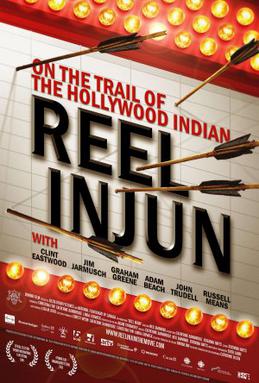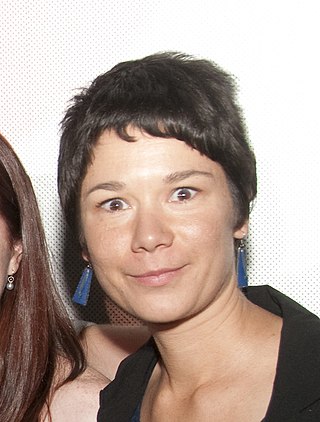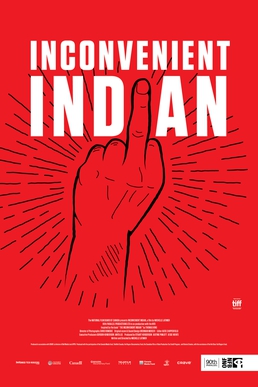Related Research Articles
The Canada Council for the Arts, commonly called the Canada Council, is a Crown corporation established in 1957 as an arts council of the Government of Canada. It is Canada's public arts funder, with a mandate to foster and promote the study and enjoyment of, and the production of works in, the arts.

Michael Greyeyes is a First Nations actor, dancer, choreographer, director, and educator.
Kanehsatake: 270 Years of Resistance is a 1993 feature-length documentary film by Alanis Obomsawin, highlighting the events of the 1990 Oka Crisis. Obomsawin documents the events of The Siege of Kanehsatake over 78 days, capturing a rare perspective of an important turning point in Canadian history. Produced by the National Film Board of Canada, the film won 18 Canadian and international awards, including the Distinguished Documentary Achievement Award from the International Documentary Association and the CITY TV Award for Best Canadian Feature Film from the Toronto Festival of Festivals.
The imagineNATIVE Film + Media Arts Festival is the world's largest Indigenous film and media arts festival, held annually in Toronto. The festival focuses on the film, video, radio, and new media work of Indigenous, Aboriginal and First Peoples from around the world. The festival includes screenings, parties, panel discussions, and cultural events.
Reelworld Film Festival, founded in 2001 by Tonya Williams, is held annually in Toronto, Ontario, Canada. The festival screens film and provides professional development for Canadian racially diverse and indigenous filmmakers and media artists.

The Serpent River First Nation, a signatory to the Robinson Huron Treaty of 1850, is an Anishinaabe First Nation in the Canadian province of Ontario, located midway between Sault Ste. Marie and Sudbury along the North Channel of Lake Huron.

Reel Injun is a 2009 Canadian documentary film directed by Cree filmmaker Neil Diamond, Catherine Bainbridge, and Jeremiah Hayes that explores the portrayal of Native Americans in film. Reel Injun is illustrated with excerpts from classic and contemporary portrayals of Native people in Hollywood movies and interviews with filmmakers, actors and film historians, while director Diamond travels across the United States to visit iconic locations in motion picture as well as American Indian history.
Helen Haig-Brown is a Tsilhqot'in filmmaker working primarily with indigenous and First Nations themes. Many of these derive from her maternal roots in the Tsilhqot'in First Nation.

Stephan James is a Canadian actor. After starring in a string of television series as a teenager, he rose to prominence upon winning a Canadian Screen Award for Best Actor for his role as track and field sprinter Jesse Owens in the 2016 film Race.
Elle-Máijá Apiniskim Tailfeathers is a Canadian filmmaker, actor, and producer. She has won several accolades for her film work, including multiple Canadian Screen Awards.

Emmanuel Kabongo is a Canadian actor and film producer. Born and raised in Zaire, now present-day Democratic Republic of the Congo, Kabongo immigrated to Canada and began his acting career as an extra before achieving recognition for his performance as the lead protagonist in the Toronto-based web series Teenagers (2014–2017), for which he earned his first Canadian Screen Award nomination. Kabongo also co-produced the series.
Roxann (Karonhiarokwas) Whitebean is an independent film director and media artist from the Mohawk Territory of Kahnawake (Canada).

Lisa Jackson is a Canadian Screen Award and Genie Award-winning Canadian and Anishinaabe filmmaker. Her films have been broadcast on APTN and Knowledge Network, as well as CBC's ZeD, Canadian Reflections and Newsworld and have screened at festivals including HotDocs, Edinburgh International Film Festival, Melbourne, Worldwide Short Film Festival and Berlin International Film Festival.
Amanda Strong is a stop-motion animation filmmaker who resides in Vancouver, Canada. She has exhibited work and her films have been screened at festivals worldwide, including Cannes Film Festival, Toronto International Film Festival, Vancouver International Film Festival, and the Ottawa International Animation Festival. Strong is Red River Métis and a member of the Manitoba Métis Federation.
Darlene Naponse is an Anishinaabe filmmaker, writer, director, and community activist from Canada. She is most noted for her 2018 film Falls Around Her, which premiered at the 2018 Toronto International Film Festival in September 2018 and subsequently won the Air Canada Audience Choice Award at the imagineNATIVE Film + Media Arts Festival in October.

Alex Sangha is a Canadian social worker and documentary film producer. He is the founder of Sher Vancouver which is a registered charity for lesbian, gay, bisexual, transgender, queer, and intersex (LGBTQI+) South Asians and their friends. Sangha was the first Sikh to become a Grand Marshal of the Vancouver Pride Parade. Sangha received the Meritorious Service Medal from Governor General Julie Payette in 2018 for his work founding Sher Vancouver. Sangha's first short documentary film, My Name Was January, won 14 awards and garnered 66 official selections at film festivals around the world. Sangha's debut feature documentary, Emergence: Out of the Shadows, was an official selection at Out on Film in Atlanta, Image+Nation in Montreal, and Reelworld in Toronto. The film was the closing night film at both the South Asian Film Festival of Montreal and the Vancouver International South Asian Film Festival where it picked up Best Documentary. Emergence: Out of the Shadows also had a double festival premiere at the KASHISH Mumbai International Queer Film Festival and the Mumbai International Film Festival during the same week, where it was in competition at both film festivals for Best Documentary. The film also had an in-person and online screening at the 46th annual Frameline: San Francisco International LGBTQ+ Film Festival which is "the longest-running, largest and most widely recognized LGBTQ+ film exhibition event in the world."
Falen Johnson is a Mohawk and Tuscarora playwright and broadcaster from Canada.
Ervin Chartrand is a Canadian and Pine Creek First Nation director, writer and producer. He is best known for directing the films 504938C (2005) and First Stories: Patrick Ross (2006).

Inconvenient Indian is a 2020 Canadian documentary film, directed by Michelle Latimer. It is an adaptation of Thomas King's non-fiction book The Inconvenient Indian, focusing on narratives of indigenous peoples of Canada. King stars as the documentary's narrator, with Gail Maurice and other indigenous artists appearing.
References
- 1 2 Wente 2021, p. 27.
- ↑ Wente 2021.
- ↑ Kuprel, Diana (2 February 2018). "Indigenous Rights Advocate Jesse Wente: Turn your passion into your career". University of Toronto. Retrieved 28 July 2020.
- ↑ "Jesse Wente". CBC. Archived from the original on 2017-05-17. Retrieved 2024-03-18.
- 1 2 "Jesse Wente Appointed Chairperson of Canada Council for the Arts". Canadianart. 28 July 2020. Retrieved 2024-03-18.
- ↑ "Board Members". Canada Council for the Arts. Retrieved 28 July 2020.
- 1 2 "iN18 Industry: Insider and Outsider: Developing New Collaboration Models". imagineNATIVE Film & Media Arts Festival. Retrieved 2018-02-01.
- ↑ "Jesse Wente - CBC Media Centre" . Retrieved 2018-02-01.
- 1 2 "Jesse Wente awarded first-ever Reelworld Reel Activist award" . Retrieved 2018-02-01.
- ↑ "Jesse Wente | Broadcaster, Advocate & Diversity Speaker". National Speakers Bureau. Retrieved 2018-02-01.
- 1 2 "Jesse Wente appointed director of Canada's new Indigenous Screen Office". CBC News. Retrieved 2018-02-01.
- ↑ "Jesse Wente appointed Director of Canada's Indigenous Screen Office - eBOSS Canada". eBOSS Canada. 2018-01-31. Retrieved 2018-02-01.